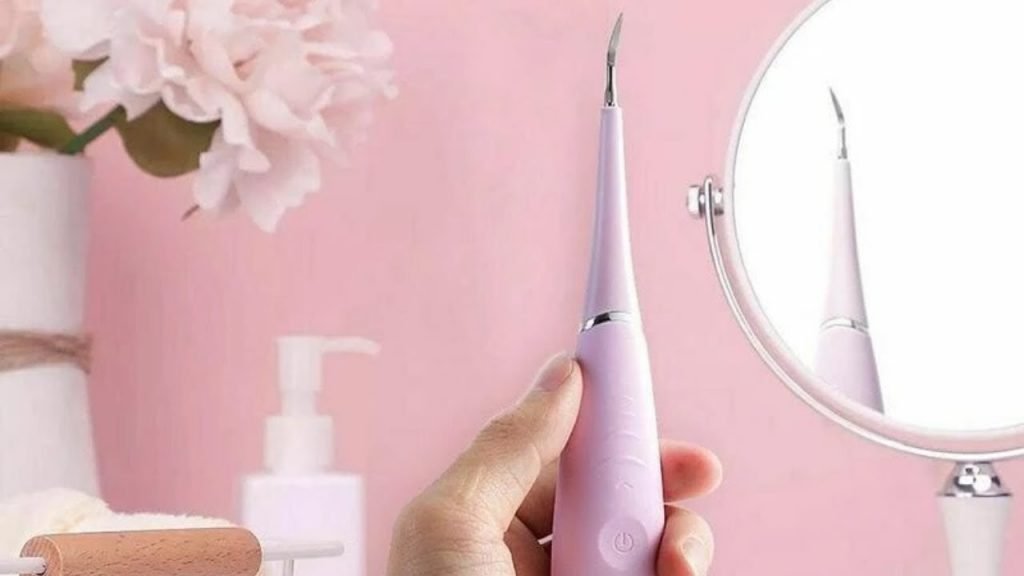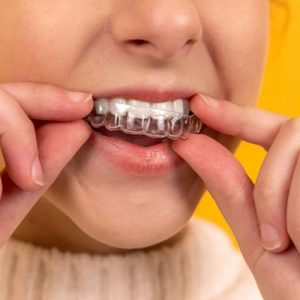Over the past few years, we’ve seen a dangerous trend that’s become particularly popular with young adults and teenagers. It’s called dental DIY, and ranges from consumer teeth whitening and mouthguards products right through to home orthodontic and teeth shaping treatments.
Some may see these DIY treatments marketed by unqualified influencers and celebrities on social media. And, they’re often presented as affordable and quick fixes for dental problems despite the severe risks. According to the American Dental Association, DIY dental procedures can actually harm the teeth, gums, bone, and the ligaments that support the teeth. There’s also a risk for long-term complications including problems with the jaw, an abnormal bite, gum disease, tooth decay, and even tooth loss.
Read on to learn about five dangerous do not try this at home dental trends.
1. Teeth whitening
As we age, our teeth naturally discolour. That, coupled with lifestyle choices such as drinking tea, coffee or dark coloured drinks, smoking, eating certain foods and taking medications, can cause staining and affect the appearance of your smile. A great way to reverse or minimise these stains is to use professional teeth whitening treatments. But beware, there are many inferior and dangerous products out there on the market unregulated, and therefore not proven to be safe or effective. So if you’re buying from an online supplier with claims that seem too good to be true, they probably are.
There are many risks to using DIY teeth whitening kits, including:
- Injury to your health from the whitening agents. This could lead to stomach problems, mouth ulcers, gum damage, and nerve damage if there are cavities in your teeth.
- Uneven whitening or bleach spots as a result of uneven application of the whitening agent.
Additionally, it’s unwise to use whitening trays that aren’t specially fitted for your mouth by a dentist because the hydrogen peroxide could leak from the trays and irritate or burn your gums. If your gums are recessed and the hydrogen peroxide touches an exposed tooth root surface, this can cause severe pain and, in some cases, a nasty infection.
2. Ultrasonic teeth cleaning
Some people may watch their dentist scrape away plaque and tartar from their teeth during their dental appointment and wonder why they can’t take care of that themselves at home for a fraction of the price.
However, cheap dentistry tools purchased online can cause severe gum damage, gum recession and can irritate or burn sensitive nerves due to the sharp surface and heat vibrations. And, you might be unable to identify when your oral tissues have been harmed. Tartar can also accidentally be pushed under the gumline, causing infections, pain and long term oral health problems. Conversely, dentists use more professional and sophisticated instruments with water that will flush away debris and tartar from the gum pockets to avoid gum irritation and infections.
3. Over the counter mouthguards
According to the Australian Dental Association (ADA), the cost of a teeth or jaw injury is far more expensive than that of a custom mouthguard. When you consider the fact that Australians spent $10.2 billion on dental services in 2016-2017, it should be a no-brainer. While custom-fitted mouthguards designed by dentists can be expensive to purchase upfront, the ADA recommends it over generic one-size-fits-all options as they provide further protection to an individual’s teeth.
Additionally, consumers have no way of knowing if the extension or fit of the mouthguard is adequate for their teeth protection. Nor are they aware of the quality of fabrication or materials of the product. Don’t risk your mouthguard falling out, becoming uncomfortable or irritating your gums. Invest in a mouthguard fit for you and you alone.
4. Teeth shaping
As reported in Bite Magazine, some TikTok users are remodelling their crooked teeth with nail files in a viral trend that dentists are dubbing ‘damaging and dumb’ and we couldn’t agree more. Shocking clips uploaded to the social media platform depict people attempting to fix their uneven smiles by using a nail file to sand their teeth down to size. What they’re attempting to achieve in dental terms is an enameloplasty: a reshaping procedure involving enamel removal that’s performed by a cosmetic dentist. However, unlike professionals who know how to do the job safely, an amateur could potentially remove vital coating, causing the tooth to become hypersensitive or even die. Don’t risk shortening the lifespan of your teeth and developing serious issues – always consult a dental or medical professional if you’re unhappy with the shape of your teeth.
5. Teeth aligning
Many people are attracted to the idea of having straighter teeth quickly and with the convenience of being at home. However, DIY braces or aligners without dentist supervision is not the answer. According to the ADA, there are many dangers and limitations of consumers attempting to move their own teeth with at-home kits.
Firstly, orthodontic treatment by dentists usually follows a series of critical steps: clinical examination, x-rays, diagnosis, and then expert treatment planning. These preliminary stages can reveal to a dentist several things:
- If a patient has problems that will be made worse by orthodontic treatment such as undiagnosed gum disease.
- There are hidden problems that will interfere with the orthodontic treatment such as unerupted extra teeth.
- If the orthodontic complaint is related to a more serious underlying condition such as cancer or bone disorders.
Secondly, many DIY aligning products use materials that aren’t designed for use in the mouth which can lead to dental complications that are more severe than the original concern.
Always consult your dentist first
The bottom line is, don’t trust your teeth with anyone or anything other than registered dental and medical practitioners. Dentistry requires many years of expert training and specialised equipment that’s not easily acquired. And, your treatment needs to be preceded by careful examination including assessment of any underlying pathology, thorough treatment planning, careful execution and ongoing follow up and care.
Additionally, if something does go wrong, consumers have little or no redress for problems or damage caused to their oral health and oral structures by DIY products purchased online, particularly if they are provided by overseas manufacturers.
Don’t risk the life of your teeth, or your health with DIY dental – make an appointment with the friendly team at Whites Dental Care in Neutral Bay if you have any dental concerns.



